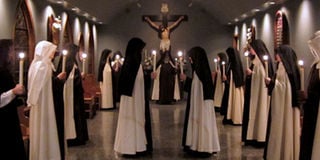Monks, nuns retreat to transform society

Carmelite monastery of the sacred heart salve regina. Photo | Carmelite us
What you need to know:
- Contemplatives: Monks or nuns retreat from society precisely to transform it through their prophetic witness and powerful prayer.
Whereas the life of this world attempts to captivate us, the contemplative life turns from temporal riches to embrace God who endures forever. The life of this world pursues selfish pleasures and desires; the consecrated life frees our affections of every possession in order fully to love God and our neighbour. Worldly life aims to do whatever we want; consecrated life chooses humble obedience to God, as the greater freedom. And while worldly life soon leaves our hands and hearts empty, life in Jesus fills us with peace to the very end.
I, recently tried to internalise these observations while accompanying the nuns of the Carmelite Order of Kiyinda Mityana on their week-long annual retreat. The retreat was in the context of the Diamond Jubilee celebrations of the canonisation of the Uganda Martyrs. It highlighted contemplative life as an extraordinary witnessing of the saving presence of Jesus in His Church and in society. In Acts 1:8, Jesus commands His disciples to be His witnesses/martyrs.
Types of martyrs
The Church categorises Monastic life as “white martyrdom”. The other categories are “red” and “green”. White Martyrdom concerns those who give up everything for the faith and follow Christ. Every Christian falls under this category, though monks or nuns go an extra mile. Red martyrs are those who lose their lives for the sake of the name of Jesus. Green martyrs dedicate their whole lives to intense prayer, extreme penance and fasting, out of love for God. It all means being at peace with ourselves and with God; able to let go of the world around us.
Monks or nuns retreat from society precisely to transform it through their prophetic witness and powerful prayer. They support themselves through hard work, dedicated to God; reminding us that all work done in God participates in His ongoing work of our redemption. This is the essential vocation of the Church.
Imitate Christ
Since the founding of the Church, Christians have answered God’s special call to follow Christ with greater liberty and to imitate Him more closely, by practising the evangelical counsels of poverty, chastity, and obedience. Lived by Christ Himself, the counsels are especially proposed by the Church as a means for attaining Christian perfection.
St Benedict of Nursia (480-547 AD) is called the father of Western Monasticism and Patron of Europe. He secured the Christian foundations of European civilisation and the entirety of Western culture. As a young man, Benedict of Nursia fled a decadent and declining Rome for further studies and deep prayer and reflection. He gave his life entirely to God.
Western monasticism led to the birth and flourishing of the academy, the arts and the emergence of Christendom. St. Benedict’s witness drew the barbarians from paganism toward a civilised and truly enhanced way of life; guiding them in building a peaceful, virtuous and productive society. It is their depth of prayer, in intimacy with God, which makes them the best of theologians, able to help the faithful in their pursuit of communion with their creator.
Helpful monasticism
Monasticism in the first millennium gave us the fountain of theological wisdom which still inspires the Church. Monks or nuns became the great teachers, fathers, confessors and prophets. Their prayer and witness kept the Church in the Divine embrace so that she could effectively continue the redemptive mission of Jesus.
They continue to be a seed of the great renewals of the Catholic Church and society.
Origin of Carmelites
The Carmelite Order began in Palestine in the 12th Century on Mount Carmel, with a group of hermits who wished to lead a solitary life like that of Elijah, with a fervent desire for God and holiness. Their Carmelite motto is adopted from Isaiah’s response to God: “With zeal have I been zealous for the Lord God of Hosts.” (1Kings 19:10).
Pathetically, post-modern society is rejecting God and objective truth, by embracing the “Dictatorship of Relativism”, as Pope Benedict called this development. However, contemplatives remind us of St Augustine’s confession: “You have made us for yourself, O Lord, and our heart is restless until it rests in you”. If we encounter God and our neighbour in the everyday events of our lives, our hearts will experience His presence and live in peace with everyone.





